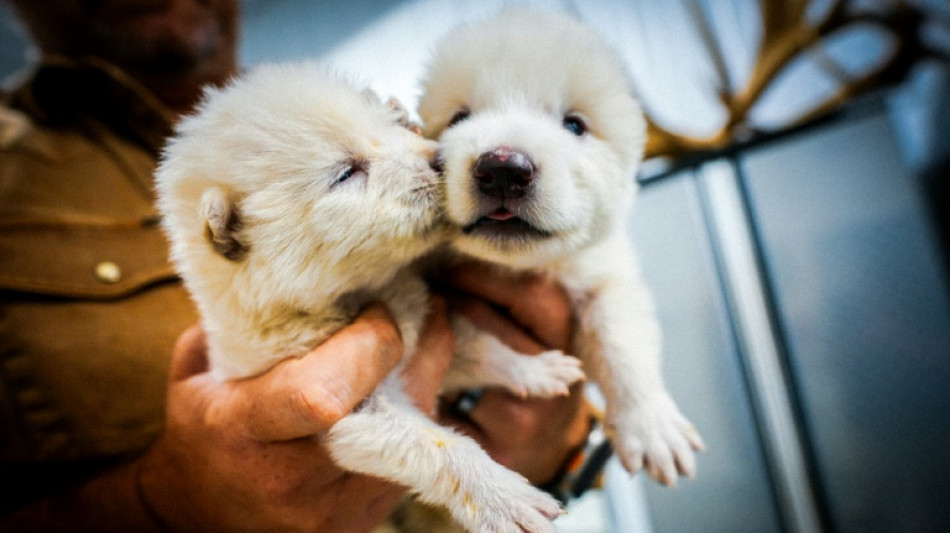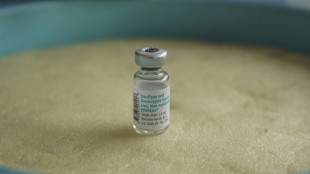
-
 Ruud keeps Barcelona Open defence on course
Ruud keeps Barcelona Open defence on course
-
Trump tariffs could put US Fed in a bind, Powell warns

-
 CONCACAF chief rejects 64-team World Cup plan for 2030
CONCACAF chief rejects 64-team World Cup plan for 2030
-
Putin praises Musk, compares him to Soviet space hero

-
 Son to miss Spurs' Europa League trip to Frankfurt
Son to miss Spurs' Europa League trip to Frankfurt
-
US senator in El Salvador seeking release of wrongly deported migrant

-
 Trump tariffs could put the US Fed in a bind, Powell warns
Trump tariffs could put the US Fed in a bind, Powell warns
-
US judge says 'probable cause' to hold Trump admin in contempt

-
 India opposition slams graft charges against Gandhis
India opposition slams graft charges against Gandhis
-
Nate Bargatze to host Emmys: organizers

-
 US Fed Chair warns of 'tension' between employment, inflation goals
US Fed Chair warns of 'tension' between employment, inflation goals
-
Trump touts trade talks, China calls out tariff 'blackmail'

-
 US judge says 'probable cause' to hold govt in contempt over deportations
US judge says 'probable cause' to hold govt in contempt over deportations
-
US eliminates unit countering foreign disinformation

-
 Germany sees 'worrying' record dry spell in early 2025
Germany sees 'worrying' record dry spell in early 2025
-
Israel says 30 percent of Gaza turned into buffer zone

-
 TikTok tests letting users add informative 'Footnotes'
TikTok tests letting users add informative 'Footnotes'
-
Global uncertainty will 'certainly' hit growth: World Bank president

-
 EU lists seven 'safe' countries of origin, tightening asylum rules
EU lists seven 'safe' countries of origin, tightening asylum rules
-
Chelsea fans must 'trust' the process despite blip, says Maresca

-
 Rebel rival government in Sudan 'not the answer': UK
Rebel rival government in Sudan 'not the answer': UK
-
Prague zoo breeds near-extinct Brazilian mergansers

-
 Macron to meet Rubio, Witkoff amid transatlantic tensions
Macron to meet Rubio, Witkoff amid transatlantic tensions
-
WTO chief says 'very concerned' as tariffs cut into global trade

-
 Sports bodies have 'no excuses' on trans rules after court ruling: campaigners
Sports bodies have 'no excuses' on trans rules after court ruling: campaigners
-
Zverev joins Shelton in Munich ATP quarters

-
 The Trump adviser who wants to rewrite the global financial system
The Trump adviser who wants to rewrite the global financial system
-
US senator travels to El Salvador over wrongly deported migrant

-
 UN watchdog chief says Iran 'not far' from nuclear bomb
UN watchdog chief says Iran 'not far' from nuclear bomb
-
Trump says 'joke' Harvard should be stripped of funds

-
 Macron vows punishment for French prison attackers
Macron vows punishment for French prison attackers
-
Canada central bank holds interest rate steady amid tariffs chaos

-
 Rubio headed to Paris for Ukraine war talks
Rubio headed to Paris for Ukraine war talks
-
Australian PM vows not to bow to Trump on national interest

-
 New attacks target France prison guard cars, home
New attacks target France prison guard cars, home
-
Global trade uncertainty could have 'severe negative consequences': WTO chief

-
 Google facing £5 bn UK lawsuit over ad searches: firms
Google facing £5 bn UK lawsuit over ad searches: firms
-
Onana to return in goal for Man Utd against Lyon: Amorim

-
 Tiktok bans user behind Gisele Pelicot 'starter kit' meme
Tiktok bans user behind Gisele Pelicot 'starter kit' meme
-
'Put it on': Dutch drive for bike helmets

-
 China's Xi meets Malaysian leaders, vows to 'safeguard' Asia allies
China's Xi meets Malaysian leaders, vows to 'safeguard' Asia allies
-
France urges release of jailed Russian journalists who covered Navalny

-
 Gabon striker Boupendza dies after 11th floor fall
Gabon striker Boupendza dies after 11th floor fall
-
UK top court rules definition of 'woman' based on sex at birth

-
 PSG keep Champions League bid alive, despite old ghosts reappearing
PSG keep Champions League bid alive, despite old ghosts reappearing
-
Stocks retreat as US hits Nvidia chip export to China

-
 China's Xi meets Malaysian leaders in diplomatic charm offensive
China's Xi meets Malaysian leaders in diplomatic charm offensive
-
Israel says no humanitarian aid will enter Gaza

-
 Anxiety clouds Easter for West Bank Christians
Anxiety clouds Easter for West Bank Christians
-
Pocket watch found on Titanic victim to go on sale in UK


US firm says it brought back extinct dire wolves
They whimper, drink from baby bottles and crawl oh so tentatively -- they look like cute white puppies, not the fruit of a daring project to resuscitate an extinct species.
A Texas startup called Colossal Biosciences made a big splash this week by releasing footage of canines they say are dire wolves, a species that vanished more than 12,000 years ago.
"For the first time in human history, Colossal successfully restored a once-eradicated species through the science of de-extinction," the company states on its website.
Photos and video of these critters have flooded social media and shaken the scientific community, which has reacted with a mix of enthusiasm and skepticism over this experiment reminiscent of "Jurassic Park" -- the fictional story of a quirky rich man's attempt to bring back the dinosaurs.
The company says it did it by tweaking the DNA of a modern-day gray wolf with carefully chosen genes from dire wolf fossils. This modified genetic material was then inserted in a grey wolf egg and implanted in a common dog as a surrogate mom.
The result: three baby dire wolves, Colossal Biosciences claims.
"I think the claims are vastly overblown," Alan Cooper, an evolutionary molecular biologist who took part in a previous study of dire wolf DNA, told AFP.
"It would be like me putting a couple of genes into you from Neanderthals that made you extra hairy and grow more muscles, and then called you a Neanderthal," said Cooper.
"That's a million miles from Neanderthal. It's a hairy human."
"This is not the dire wolf. This is something they have created that has phenotypic characteristics of dire wolf,” said Lisette Waits, an ecologist and professor of wildlife resources at the University of Idaho.
Waits, who has worked extensively on grey wolf genetics and red wolf conservation issues, nonetheless called this achievement a breakthrough.
The pups are named Romulus and Remus, in a nod to the twin brothers of Roman mythology, and Khaleesi, of "Game of Thrones" fame.
- Debate -
The Colossal Biosciences team studied DNA from two dire wolf fossils -- a tooth from 13,000 years ago and a skull fragment dated back 72,000 years -- and compared them to the DNA of the gray wolf, a species that is alive and well.
The team concluded these two kinds of DNA are around 99.5 percent identical, Beth Shapiro, the company's chief science officer, told AFP.
An analysis of the differences between the two kinds of DNA determined which genes could be responsible for the dire wolf's size, muscle structure and its white fur.
With this information the team modified blood cells from a grey wolf by inserting some of those dire wolf genes. A total of 20 changes were made using the genetic manipulation technique known as Crispr-Cas 9, which is also used in human genetics.
The blood cells were then transferred to a gray wolf egg cell that was implanted in a dog. The results: Romulus, Remus and Khaleesi.
Whether these animals are actual dire wolves or simply genetically modified gray wolves, Shapiro insisted, "is a semantic, philosophical argument."
She added that it will never be possible to create an animal that is 100 percent genetically identical to a species that is extinct.
"But neither is that the goal. Our goal is to create functional equivalents of those species,” the scientist said.
- Dodos and wooly mammoths -
The company plans to apply this technique to dodo birds and woolly mammoths.
Just last month it released photos of mice injected with genetic material from one of those extinct pachyderms, yielding controversy and some very furry rodents.
Some scientists say the goal of recreating extinct species is unattainable and even dangerous. But others welcome it as an ambitious way to fight the planet's steady loss of biodiversity.
Waits, the conservation specialist, said that aside from the hoopla over this experiment this technique could help endangered species recover.
Colossal Biosciences has managed to lure more than $200 million in investment money, which would be a very tall task for other conservation causes, she added.
Ronald Sandler, a professor of philosophy and ethics at Northeastern University, said he worries this technique might lead to "moral distraction" away from the causes of animals going extinct, like climate change and habitat loss.
Th.Berger--AMWN



